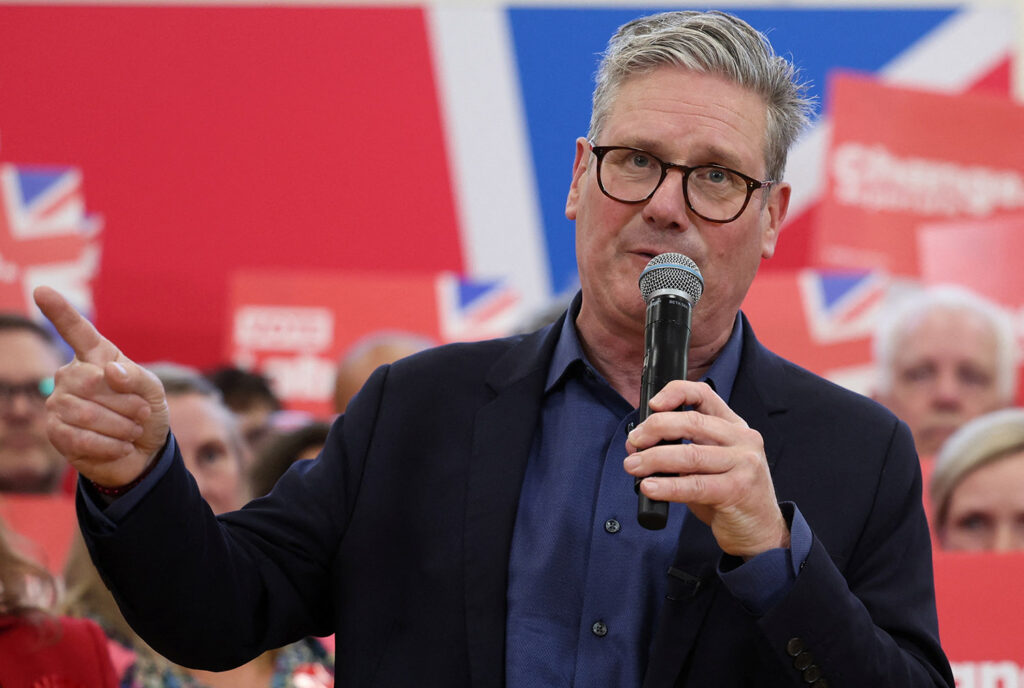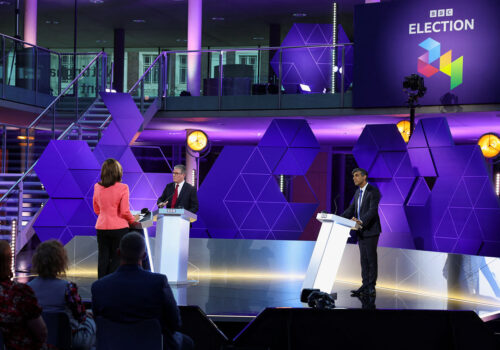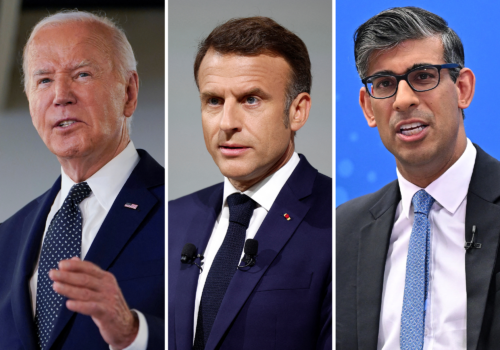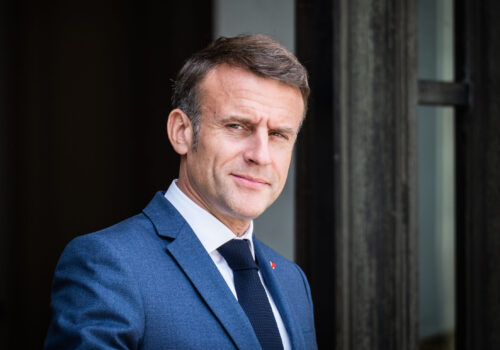After fourteen years, a changing of the guard. The United Kingdom’s Labour Party romped to victory in Thursday’s general elections, winning power for the first time since 2010. Incoming Prime Minister Keir Starmer will have to address Britain’s economic woes, but what other priorities will he have? What about the United Kingdom’s role on the world stage, and its transatlantic and cross-Channel relationships? Our experts answer those pressing questions below.
Click to jump to an expert reaction:
Philippe Dickinson: Expect continuity on major foreign and defense policies
Livia Godaert: Watch for economic reforms and a power-sharing shift
Nicole Lawler: The UK will get closer (but not too close) with Europe
John M. Roberts: Starmer’s first act toward national renewal is ensuring stability
Expect continuity on major foreign and defense policies
After fourteen years of Conservative government, Labour’s one-word campaign slogan said it all: “Change.” But when it comes to the major foreign and defense policy issues of the day, “continuity” might be more appropriate.
The United Kingdom has been one of the strongest supporters of Ukraine since Russia’s illegal full-scale invasion in 2022 and spends more on defense than any other European NATO member. These are consensus issues in mainstream British politics. If anything, on the campaign trail, Labour and the Conservatives sought to outdo each other in the resoluteness of their support for Ukraine and the urgency of their plans to increase defense spending to 2.5 percent of gross domestic product (GDP).
This is central to Starmer’s political project. When he became Labour Party leader in 2020, Starmer took over a party that had just suffered its worst electoral defeat since 1935 under the leadership of Jeremy Corbyn, a figure from the party’s pre-Tony Blair left. Restoring Labour’s credibility on national security and defense was an early priority for Starmer. He firmly declared Labour’s support for NATO—pointing out that Labour Foreign Secretary Ernest Bevin was one of the Alliance’s founding fathers in 1949—and re-committed to the United Kingdom’s nuclear deterrence (known as “trident”).
This worldview permeates the party’s election manifesto, which describes its commitment to trident as “absolute” and promises to apply a “NATO test to major defense programmes” to meet obligations. The new government will conduct a Strategic Defence Review in its first year, setting out the path to spending 2.5 percent of GDP on defense and the ways in which a proposed UK-EU security pact could strengthen NATO. On Ukraine, the incoming government has pledged “steadfast” support. It has backed calls to repurpose frozen Russian assets in support of Ukraine, and it intends to play a “leading role in providing Ukraine with a clear path to NATO membership.”
For the incoming government, there will be no time to waste. After six weeks of talking the talk on the campaign trail, week one in office coincides with the Washington NATO Summit—an ideal opportunity for the new prime minister to walk the walk on the world stage.
—Philippe Dickinson is a deputy director with the Atlantic Council’s Transatlantic Security Initiative, within the Scowcroft Center for Strategy and Security. He previously served on the political team at the British Embassy in Washington, DC.
Watch for economic reforms and a power-sharing shift
Labour’s landslide victory in the general elections follows years of political instability and chaos. The postmortem of the last few governments reads like a rejected political satire, but the most important takeaway from the absolute drubbing the Conservatives have just received is that Labour has now inherited an angry and impatient electorate ready to see their lives improve under the new government.
Starmer is not a particularly radical Labour leader. Under the former crown prosecutor, Labour has committed to maintaining the status quo on tax rates and has pledged to reduce net migration—policies that represent a rather conservative ethos. Nevertheless, the party has laid out a big vision for Britain’s economic future: setting up Great British Energy (a publically owned clean energy company), renationalizing the railways as contracts expire, and implementing a new industrial strategy, to name a few major policies. These are lofty goals, but not impossible to achieve with the mandate that Labour has received. The previous government got caught up in its own machinations, leaving it directionless, and the Labour government must maintain its discipline to achieve its ambitions.
On foreign policy and defense, there won’t be major shifts. The United Kingdom will still be an active NATO member, and it will push to raise defense spending to 2.5 percent of gross domestic product (as the Conservatives also pledged). However, Labour has made clear that a closer relationship with the EU is a priority. Another key difference with the Conservatives is that in its manifesto, Labour commits to pushing for an immediate ceasefire in Gaza, with unimpeded aid access to Gaza and recognition of a Palestinian state as part of a two-state solution and future peace process with Israel.
Labour has also made proposals with constitutional implications for the United Kingdom. In its manifesto, Labour says it will reset the relationship between Westminster and the devolved governments in Scotland, Wales, and Northern Ireland. The manifesto also outlines a new Council of the Nations and Regions, which would include the prime minister, leaders of the devolved national governments, and mayors of major regions across the United Kingdom. This power-sharing shift—which would also be evident in changes to transportation, employment, planning, and housing—is a departure from Westminster’s strict hold over the regions and is worth watching in the coming years.
The second area to watch is matters of democratic representation, a contrast to the illiberal moves seen across democracies in recent years. Labour outlines significant reforms—and the eventual replacement—of the unelected House of Lords, as well as stricter rules around the conduct of ministers and members of parliament. Its manifesto also includes lowering the voting age to sixteen in all elections and fixes to uneven voter identification requirements. This expansion of representation is a welcome change given the threats to democracy across the world, and the United Kingdom could emerge as a leader in this regard if Labour manages to implement this agenda.
To be clear, this is the Labour win through rose-colored glasses. The new government has an uphill battle to fight after the last several years of chaos. Its biggest challenge will be to maintain its will and focus amid both local and global crises. By solving immediate cost-of-living and economic concerns, Labour can establish trust with a jaded electorate and then tackle the major changes the party has campaigned on. But its members have to fend off political distraction to do so.
—Livia Godaert is a nonresident fellow at the Atlantic Council’s Europe Center.
The UK will get closer (but not too close) with Europe
Labour’s victory in this election sends a clear signal to the European Union (EU): The United Kingdom is willing to improve its relationship with Europe. How far relations between the two partners develop will depend on the Labour government’s ambitions and what the EU is willing (or unwilling) to accept when it comes to trade. While Labour has expressed its intentions to restore relations with Europe after eight years of strained ties resulting from Brexit, it has not been very specific about its goals. If anything, what Labour has been clear about is not rejoining the EU’s single market or customs union, or allowing for the free movement of people between the UK’s borders with the EU.
Nonetheless, Labour has campaigned as the pro-business choice for Britain and will likely seek to remove remaining trade barriers with Europe for the benefit of Britain’s small and medium-sized enterprises. The EU, however, is unlikely to accept these terms if it means the United Kingdom will “cherry-pick” access to its single market. This poses a problem for Labour’s intentions to revisit the Brexit deal, which Starmer in the past has referred to as “botched.” With little appetite to renegotiate a Brexit trade deal, the EU won’t accept any new deal without receiving some concessions. The EU likely will push on the free movement of people (particularly a youth mobility scheme) as a quid pro quo. It will be important for the Labour government to strike the right balance in its trade relationship with the EU, which remains the United Kingdom’s largest trading partner. Labour at minimum has agreed to recognize certain professional qualifications and negotiate a veterinary agreement with the EU to avoid extra checks on animal products, which could be beneficial for both parties. The latter would inevitably invite at least some level of oversight by the European Court of Justice, however, which Conservatives argue could “unravel” Brexit and undermine British sovereignty.
If the United Kingdom seeks to build trust and make the EU-UK relationship more productive, it will need to look beyond trade deals and market access. Labour’s plans for a joint EU-UK defense pact, which would formalize bilateral security cooperation, could be a step in the right direction. If successful, it may open the door for further cooperation between the two partners, particularly at a time when Europe is becoming more isolated under geopolitical pressures.
—Nicole Lawler is an assistant director at the Atlantic Council’s Europe Center.
Starmer’s first act toward national renewal is ensuring stability
Change means stability. That’s the paradox at the heart of Starmer’s accession to office as prime minister of the United Kingdom of Great Britain and Northern Ireland. To the rest of the world, stability is the key. There will be no change to UK policies regarding its belief in the importance of a strong relationship with the United States, its role in NATO, and its support for Ukraine. But change means stability precisely because the last several years of Conservative rule have been so erratic, including five changes of prime minister in the last nine years.
With an electoral mandate backed by 412 seats in the 650-seat House of Commons, and with none of the personal foibles that destroyed the premiership of Boris Johnson, Starmer can likely look forward to five years in office before calling the United Kingdom’s next general election. And if the precedent of Tony Blair, the last Labour leader to take his party from opposition to government, is any guide, Starmer has a good prospect of winning the next election, too. All of this prepares the ground for the Labour government to deliver what Starmer has termed “a decade of national renewal.”
Starmer inherits a Treasury that has almost certainly no spare cash whatsoever for ambitious programs to boost welfare or invest in new infrastructure or enterprises. So he will need to focus his economic policy on promoting economic growth in order to secure the funds necessary to rebuild Britain’s stretched and crumbling services and infrastructure without resorting to the imposition of tax increases on working people.
As for climate change, Starmer remains committed to the United Kingdom’s legally mandated task of delivering net-zero carbon emissions by 2050. The difference with his predecessors is that Starmer’s team appears committed to promoting the primacy of reliance on renewable energy sources and energy efficiency, whereas recent Conservative governments have sought to include fresh production of oil and gas from Britain’s offshore fields—and even a new coal mine—while backtracking on environmental regulations.
Upon taking office on Friday, Starmer said that his mission is to deliver “a calm and patient rebuilding,” carried out by a government of service “for a mission of national renewal.” It won’t be easy. But he has already reassured the markets, with the arrival of this first Labour government in fourteen years prompting small but healthy boosts to the stock market and to the pound sterling in currency markets.
—John M. Roberts is a nonresident senior fellow at Atlantic Council’s Global Energy Center and a resident of Jedburgh, Scotland, United Kingdom.
Further reading
Sat, Jun 29, 2024
Your primer on the United Kingdom’s general elections
Eye on Europe's elections By Nicole Lawler, Livia Godaert
As the United Kingdom heads to the polls on July 4, our experts break down the key issues and dynamics at play.
Thu, Jul 4, 2024
What do Biden, Macron, and Sunak have in common? They brought it on themselves.
Inflection Points Today By Frederick Kempe
US President Joe Biden, French President Emmanuel Macron, and British Prime Minister Rishi Sunak are suffering from self-inflicted wounds that are likely to have long-term political and economic consequences.
Mon, Jul 1, 2024
Will Macron be the undoing of European centrist politics?
New Atlanticist By Jörn Fleck
Results from the first round of the French snap parliamentary elections show that the president's previously successful strategy of scaring voters about the potential of the right and left is falling flat.
Image: British opposition Labour Party leader Keir Starmer speaks at a Labour general election campaign event, in Redditch, Britain July 3, 2024. Photo via REUTERS/Phil Noble.



